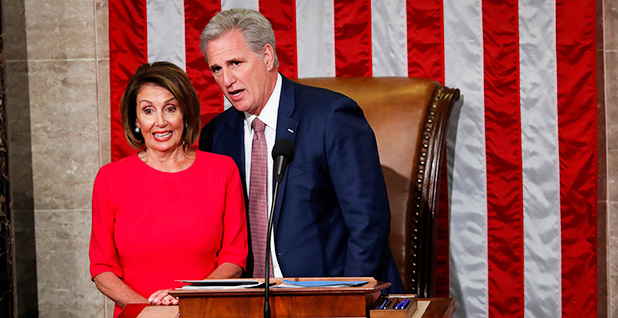Image Credits: Kevin Lamarque/REUTERS/Newscom.
I’ve written about Kevin McCarthy’s struggle to become the next Speaker of the House before, and now I believe is the time to write about it again. The New York Times reports that he’s making little progress in securing the votes he needs. The problem appears to be entirely driven by Republican holdouts on the far right.
…Republicans agitating against him have insisted that Mr. McCarthy would not be able to win election on the floor, warning that more defectors would emerge in the coming weeks.
“I don’t think he has a plan, other than to hope that conservatives fold,” Russ Vought, the president of the right-wing Center for Renewing America, said of Mr. McCarthy in an interview. “And this is not the part of the Republican conference that folds.”
Before I get started, here are a few reminders. The election for Speaker begins when the new U.S. House of Representatives convenes on January 3, 2023. It’s the first order of business after the daily prayer, the pledge of allegiance and a quorum call. Normally, it’s primarily a contest between one Republican nominee and one Democratic nominee, each selected at earlier party caucus elections, but some protest votes are usually cast for other candidates. Technically, the Speaker does not have to be a member of the House. To win, the candidate must win an outright majority of those present and voting (a full House has 435 members so 218 votes are required). Members can abstain, which lowers the vote threshold. Normally, candidates do not cast a vote but they are permitted to do so.
There should be two Democratic vacancies. One is due to the November 28, 2022 death of Donald McEachin from Virginia’s 4th District. There will be a special election to fill his seat on February 21, 2023. The other will be created when Karen Bass resigns her seat to begin serving as the mayor of Los Angeles, California. Therefore, I anticipate that the Speaker’s election will involve 222 Republicans and 211 Democrats, so absent an abstention, 217 votes will be required for victory. Hakeem Jeffries of New York will be the Democrats’ candidate. McCarthy can lose no more than five votes.
Now, going back to Mr. Vought’s point above, the far right hardliners don’t seem inclined to back down. If they follow through and deny McCarthy a majority, the House will keep voting until someone gets a majority. There really aren’t an ironclad rules about how this will occur because no one is really in charge of the House until after a Speaker is selected. Prior to that, the clerk of the House and the sergeant at arms run the show, although a majority of members can overrule them.
The number one demand of the far right is that McCarthy agree to allow a snap vote at any time that would kick the Speaker out and cause a new election. McCarthy refuses to grant this because he knows it led to the downfall of Speaker John Boehner, and it would make it impossible for him make compromises with the Democrats–compromises that will be required to fund the government and pay its bills on time. The truth is, consenting to this condition would make winning the Speaker’s gavel pointless because he couldn’t responsibly hold on to it.
This problem isn’t particular to McCarthy. It would apply equally to any Republican Speaker relying strictly on Republican members’ support to maintain their position. So, if this condition doesn’t change, seemingly the only way around it is to elect a Speaker with at least enough Democratic support to overcome far right resistance.
Theoretically, there are some other things that could happen. After many failed ballots, a majority of the House could get frustrated and change the rules to allow the Speaker to be elected by a plurality, although getting a majority for the rule change would present similar challenges. And a minority Speaker couldn’t function without even more rule changes to protect their position.
So, at some point it may become necessary for the House to seek a very unconventional solution in which the majority caucus is bipartisan. Some Republicans could split off and vote for a Democrat or, far more likely, nearly all Democrats could agree to vote for a moderate Republican.
Either of these hard-to-envision scenarios would require a lot of horse trading about leadership positions, committee chairmanships, and committee memberships.
Here’s a reasonable compromise based on an arrangement for power sharing within a House governing caucus made up of all (or nearly all) the Democrats, a Republican Speaker, and 10-15 moderate Republicans.
The Republican Speaker would get most of the leadership positions, but not the second-in-command Majority Leader position. That would likely go to Hakeem Jeffries. The Speaker would also be able to appoint the chairpersons for key committees, including Rules, Budget, and Appropriations. This would give the Speaker firm control of how business is conducted, what comes to the floor and under what conditions, and the ultimate say-so on spending priorities and bills. In return, the Democrats would get a firm commitment to support Ukraine, raise the debt ceiling as needed and eschew government shutdowns as a negotiating strategy. They’d also get the chairs of most committees and subcommittees, including Judiciary and Oversight, which would protect against ridiculous investigations about Hunter Biden, Benghazi or whatever other nonsense the right wants to pursue.
Whether or not such a coalition could accomplish anything beyond the bare minimum, it would keep the government operational and allow the Biden administration to conduct foreign policy without congressional sabotage.
It’s easy to see why the Democrats would agree to this, as it’s preferable in every way to being in the minority and would give Biden huge advantages as he seeks reelection. The moderate Republicans would be in a much more ambiguous situation, and it’s not something they’d eagerly embrace. They’d only do it if the alternatives are worse.
Will they find a way to find a compromise with the far right rather than enter into such an agreement with the Democrats?
I think it’s likely, but maybe not before creating a credible threat of a bipartisan majority that forces the far right to back down on some of their demands, including their insistence on being able to recall the Speaker at any time.
The Democrats should be preparing now for these eventualities and the negotiations and voting strategies that will be required to pull it off.







